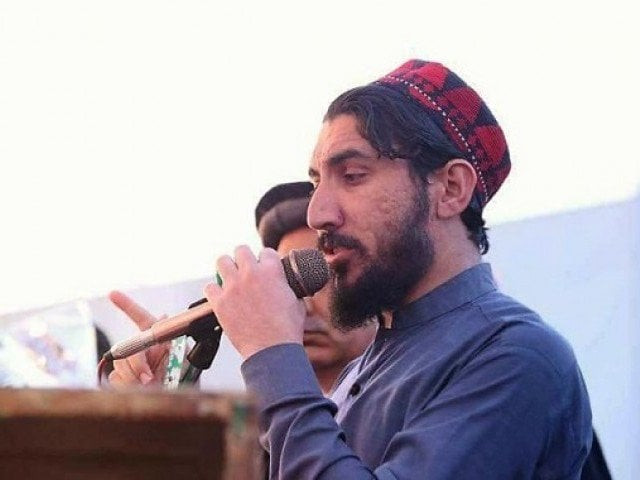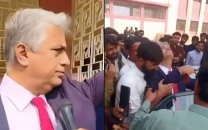Govt bans PTM under anti-terror law
Govt bans PTM under anti-terror law

Five years after the then DG ISPR warned the Pashtun Tahafuz Movement (PTM) that its "time is up," the federal government finally showed PTM the red card on Sunday by declaring it a proscribed organisation under the Anti-Terrorism Act, 1997.
The decision to ban PTM – generally known as a social movement for Pashtun human rights – was made on the grounds that the group allegedly posed a threat to national peace and security, sources within the Ministry of Interior confirmed.
Though PTM has long been in the crosshairs of powerful stakeholders, it is the PML-N-led coalition that has finally blown the whistle and sent the movement off the field.
The government has invoked Section 11-B of the Anti-Terrorism Act of 1997 to ban PTM, placing the movement on the Act's First Schedule – a roll call of outlawed groups. The move brings harsh repercussions: PTM's offices will be shut down, its public discourse silenced, bank accounts frozen, and its members at risk of arrest.
According to a notification of the Ministry of Interior, the government's decision has come as "the federal government having reasons to believe that Pashtun Tahafuz Movement (PTM) is engaged in certain activities which are prejudicial to the peace and security of the country."
Subsequently, it added, "In exercise of the powers conferred by section 11B of the Anti-Terrorism Act, 1997 (XXVII of 1997), the federal government is pleased to list the Pashtun Tahafuz Movement (PTM) in the First Schedule as a proscribed organization for the purposes of the said Act."
PTM, a rights-based movement founded in May 2014 and led by Manzoor Pashteen, emerged as a platform to highlight issues faced by Pashtuns, particularly in the tribal regions.
Besides calling for the de-mining of the former tribal areas and greater freedom of movement, it insisted on an end to the practices of extrajudicial killings, enforced disappearances and unlawful detentions, and for their practitioners to be held to account within a truth and reconciliation framework.
While PTM claimed to be a peaceful movement operating within the constitutional boundaries, powerful stakeholders often accused it of sowing ethnic discord and following foreign agendas, with backing from Afghanistan.
During a press conference at the General Headquarters in April 2019, the then Director General of Inter-Services Public Relations Maj Gen Asif Ghafoor had said that the Pakistan Army aims to resolve the grievances of Pashtuns but will no longer tolerate PTM's methods of protest.
He had alleged the movement had received foreign funding and warned that "their time is up," indicating potential action against the group while stressing that any measures would be lawful.
Under Section 11B (Proscription of organizations) (1), the Federal Government may, by order published in the official Gazette, list an organization as a proscribed organisation in the First Schedule on an ex parte basis.
It says that the decision can come if there are reasonable grounds to believe that it is (a) concerned with terrorism; (b) owned or controlled, directly or indirectly, by any individual or organisation proscribed under this Act; or (c) acting on behalf of, or at the direction of, any individual or organization proscribed under this Act.
Despite the announcement of the ban, the PTM can challenge the decision as section 11C (right of review) states that if the proscribed organization is aggrieved by the order of the federal government, made under section 11B, it may, within 30 days of such order, file a review application, in writing before the federal government stating the grounds on which it is made.
Subsequently, it maintains, the federal government shall, after hearing the applicant, decide the matter on reasonable grounds within 90 days.
Moreover, an organisation whose review application has been refused under sub-section (1), it adds, can file an appeal to the high court within 30 days of the refusal of the review application.
Once an organisation is declared proscribed, Section 11E (measure to be taken against a proscribed organisation) of ATA states that its offices, if any, shall be sealed; all literature, posters, banners or printed, electronic, digital or other material shall be seized; and publication, printing or dissemination of any press statements, press conferences or public utterances by or on behalf of or in support of a proscribed organization shall be prohibited.
The section adds that the office bearers, activists, or the members or the associates of such organisation are liable to not get any passport or allowed to travel abroad; no bank or financial institution or any other entity providing financial support shall provide any loan facility or financial support to such persons or issue the credit cards to such persons; and their arms licenses are cancelled.
Moreover, it says, that the proscribed organisation shall submit all accounts of its income and expenditure for its political and social welfare activities and disclose all funding sources to the competent authority designated by the federal government.




















COMMENTS (2)
Comments are moderated and generally will be posted if they are on-topic and not abusive.
For more information, please see our Comments FAQ